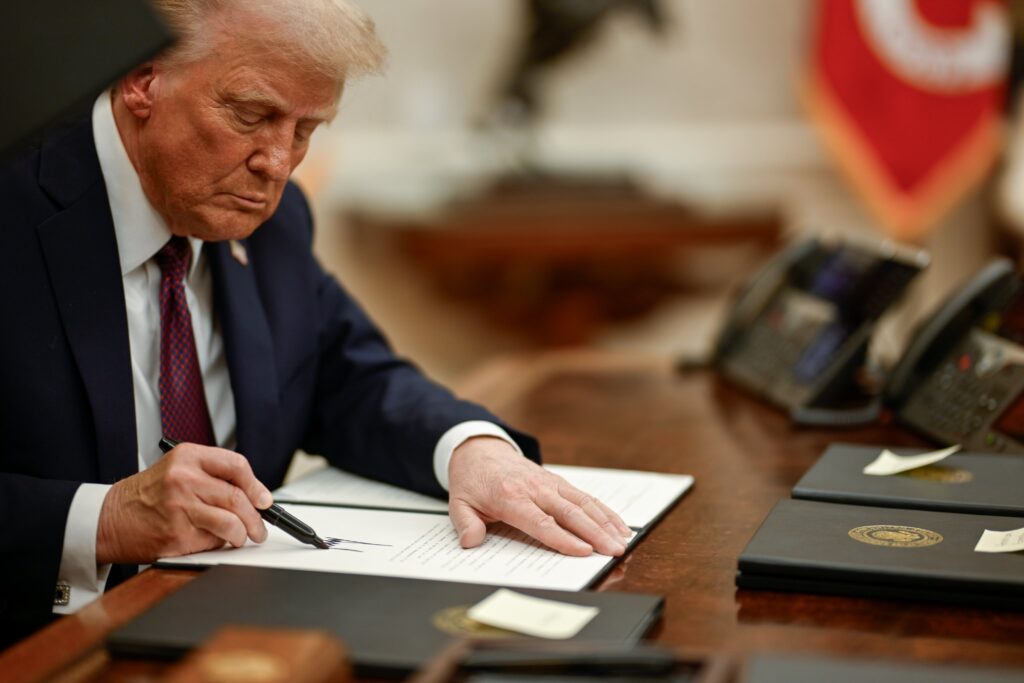The Indian government expressed its concerns on Saturday regarding President Donald Trump's recent push to significantly alter American immigration policy, specifically the H-1B visa program, which plays a crucial role in allowing tech workers from India and other countries to work in the United States. On Friday, Trump signed a proclamation that mandates an annual fee of $100,000 for H-1B visas, which are designed for high-skilled jobs that tech companies in the U.S. struggle to fill. In addition, he introduced a $1 million 'gold card' visa aimed at wealthy individuals, a move that has garnered significant criticism and could face legal challenges due to its potential circumvention of Congress. If these changes are implemented, the visa fees for skilled workers would surge from the current rate of $215, which has raised alarms regarding their implications on international workers and families.
India's Ministry of External Affairs stated that Trump's proposed plan is being evaluated by concerned parties, including Indian industry representatives, highlighting worries that such measures could have humanitarian consequences due to potential disruptions in family structures. With over 70% of H-1B visa holders originating from India, the stakes are high for many families who might be affected by these policy shifts.
Critics of the H-1B visa program have long argued that it undermines American labor by attracting foreign workers who often accept lower salaries. Trump insisted that the tech industry would back this initiative, and Commerce Secretary Howard Lutnick claimed that large companies are on board with the changes. However, the U.S. Chamber of Commerce expressed concerns over the implications for both employees and American employers, indicating efforts to work with the administration to understand the dimensions of the situation.
The newly proposed fees could drastically lower the number of H-1B visas issued annually, potentially leading tech companies to focus on training American workers rather than hiring foreign talent. Notably, the tech industry has typically reached out to H-1B workers mostly for roles that require advanced skills, yet have been criticized for frequently assigning these visas to entry-level positions, undermining the intention of the program.
In a broader context, Trump's immigration policy actions included creating a 'Platinum Card' that would allow select foreigners temporary residency in the U.S. for a hefty fee while promising benefits that have garnered mixed reactions among industry leaders and legislators alike. This strategy also brings forth legality questions regarding authority and responsibility in setting such immigration policies, as various economists and legal experts indicated that altering visa costs without congressional oversight subverts established governance and could create further instability in the immigration system.
These developments have also rekindled discussions surrounding previous attempts to reform the H-1B visa lottery system, with proposals advocating for a bidding process that would offer visas to employers willing to pay higher wages. As the implications of these policy shifts unfold, they continue to attract numerous perspectives about their potential impact on labor rights, economic well-being, and international relations.
India's Ministry of External Affairs stated that Trump's proposed plan is being evaluated by concerned parties, including Indian industry representatives, highlighting worries that such measures could have humanitarian consequences due to potential disruptions in family structures. With over 70% of H-1B visa holders originating from India, the stakes are high for many families who might be affected by these policy shifts.
Critics of the H-1B visa program have long argued that it undermines American labor by attracting foreign workers who often accept lower salaries. Trump insisted that the tech industry would back this initiative, and Commerce Secretary Howard Lutnick claimed that large companies are on board with the changes. However, the U.S. Chamber of Commerce expressed concerns over the implications for both employees and American employers, indicating efforts to work with the administration to understand the dimensions of the situation.
The newly proposed fees could drastically lower the number of H-1B visas issued annually, potentially leading tech companies to focus on training American workers rather than hiring foreign talent. Notably, the tech industry has typically reached out to H-1B workers mostly for roles that require advanced skills, yet have been criticized for frequently assigning these visas to entry-level positions, undermining the intention of the program.
In a broader context, Trump's immigration policy actions included creating a 'Platinum Card' that would allow select foreigners temporary residency in the U.S. for a hefty fee while promising benefits that have garnered mixed reactions among industry leaders and legislators alike. This strategy also brings forth legality questions regarding authority and responsibility in setting such immigration policies, as various economists and legal experts indicated that altering visa costs without congressional oversight subverts established governance and could create further instability in the immigration system.
These developments have also rekindled discussions surrounding previous attempts to reform the H-1B visa lottery system, with proposals advocating for a bidding process that would offer visas to employers willing to pay higher wages. As the implications of these policy shifts unfold, they continue to attract numerous perspectives about their potential impact on labor rights, economic well-being, and international relations.

















